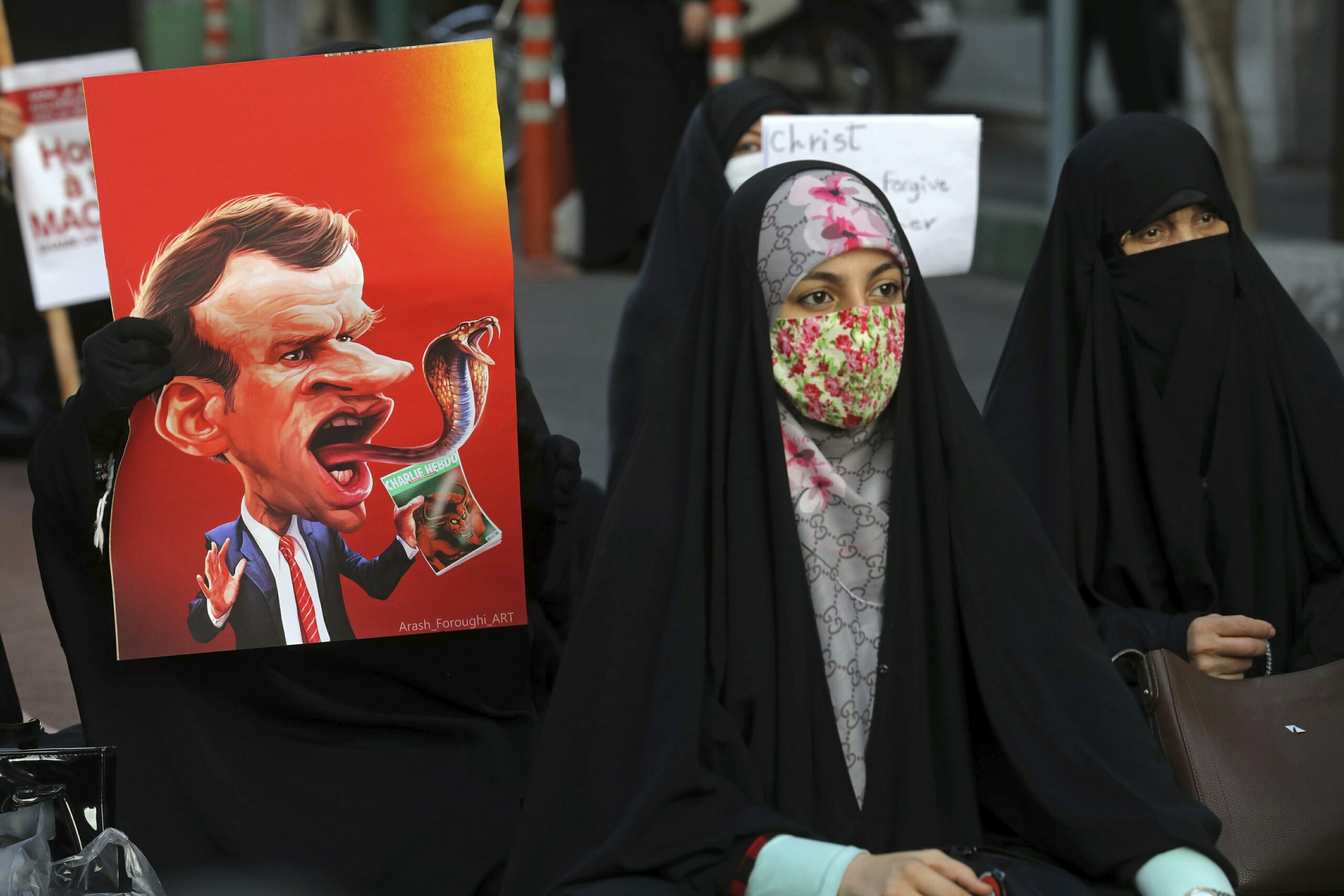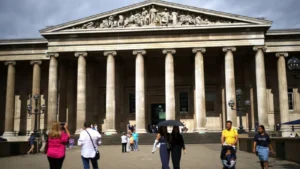
Iranian protesters hold defaced pictures of French President Emmanuel Macron during a protest against Macron and the publishing of caricatures of the Prophet Muhammad they deem blasphemous, in front of French Embassy in Tehran, Iran, Wednesday, Oct. 28, 2020. Macron has vowed his country will not back down from its secular ideals and defense of free speech. (AP Photo/Ebrahim Noroozi)
Iranian protesters hold defaced pictures of French President Emmanuel Macron during a protest against Macron and the publishing of caricatures of the Prophet Muhammad they deem blasphemous, in front of French Embassy in Tehran, Iran, Wednesday, Oct. 28, 2020. Macron has vowed his country will not back down from its secular ideals and defense of free speech. (AP Photo/Ebrahim Noroozi)
ANKARA, Turkey (AP) — Turkish officials on Wednesday railed against French satirical magazine Charlie Hebdo over its cover-page cartoon mocking Turkish President Recep Tayyip Erdogan and accused the publication of sowing “the seeds of hatred and animosity.”
The cartoon could further heighten tensions between Turkey and France over French President Emmanuel Macron’s firm stance against Islamism following the beheading of a teacher who showed caricatures of the Prophet Muhammad for a class lesson on free speech.
Leaders from around the Muslim world added their criticism of what they see as attacks on Islam in the West, while France vowed not to back away from defending freedom of expression.
The cartoons that led to the teacher’s death were the same drawings that were at the center of a deadly 2015 extremist attack on Charlie Hebdo’s staff.
The Prophet Muhammad cartoons upset many in the Muslim world. But it was Erdogan who led the charge against France and questioned Macron’s mental state. France then recalled its ambassador to Turkey for consultations, a first in French-Turkish diplomatic relations.
VERTISEMENT
“We strongly condemn the publication concerning our president of the French magazine, which has no respect to faith, the sacred and values,” Erdogan’s spokesman, Ibrahim Kalin, wrote on Twitter.
The Ankara Chief Prosecutor’s office launched an investigation into Charlie Hebdo managers over the cartoon, Tukey’s state-run Anadolu news agency reported. Insulting the president is a crime in Turkey punishable by up to four years in prison.
Turkey’s Foreign Ministry later summoned the French charge d’affaires to protest the cartoon and to demand that the French authorities “take the necessary political and legal steps” against the drawings, which the ministry said “exceed the boundaries of freedom of expression,” Anadolu reported.
Erdogan himself said he had not looked at the drawing and had nothing to say about the “dishonorable” publication.
“My sadness and anger does not stem from the disgusting attack on my person but from the fact that the same (publication) is the source of the impertinent attack on my dear Prophet,” Erdogan told his ruling party’s legislators in parliament.
He went on to criticize France and other Europe nations’ colonial past saying: “You are murderers!”
Tensions between France and Turkey have mounted in recent months over Turkish actions in Syria, Libya and the Caucasus Mountains region of Nagorno-Karabakh.
The cartoon depicted Erdogan in his underwear holding a drink and lifting the skirt of a woman wearing an Islamic dress.
“I condemn this incorrigible French rag’s immoral publication concerning our president,” Turkish Vice President Fuat Oktay wrote on Twitter.
Macron’s stance sparked anti-France protests in Turkey and in other Muslim countries as well as calls for the boycott of French goods.
French government spokesman Gabriel Attal said the country would not back down in the face of what he called “efforts of destabilization, of intimidation.”
“France will never renounce its principles and values, and notably the freedom of expression and freedom of publication” Attal said.
“It was hateful comments toward journalists, toward a newsroom, that led to the bloodshed we have seen in recent years in our country,” he said, referring to the 2015 attack on Charlie Hebdo attack that killed 12 people and was the first in a series of extremist attacks on France.
In Egypt, the country’s top Muslim cleric called on the international community to adopt universal legislation criminalizing anti-Muslim discrimination and activities.
At a gathering celebrating Prophet Muhammad’s birthday, Sheikh Ahmed al-Tayeb, Al-Azhar’s Grand Imam, also condemned the slaying of the French teacher in Paris as “an odious and painful murder.”
He said that offending Islam and Muslims has become a tool to mobilize votes. He called the “offensive cartoons” depicting Muhammad “a blatant hostility against this noble religion and its prophet.”
Full Coverage: Turkey
Egypt’s President Abdel-Fattah el-Sissi said that offending the prophet undermines “high values” many Muslims believe in. “We, too, have rights; right of not to hurt our feelings and not to offend our values,” he said.
Speaking at a Cabinet meeting, Iran’s President Hassan Rouhani also weighed in on the debate.
“If Europe and France are after rights, ethics and culture they have to withdraw from intervention in Muslim affairs,” Rouhani said.
Scores of people gathered in front of the French Embassy in Tehran, setting the French flag on fire and chanting “Death to France.”
Pakistani Prime Minister Imran Khan meanwhile, wrote letters to the heads of Muslim states, expressing his concern over the “ridicule and mockery” of Islam’s Prophet Muhammad and desecration of the Quran in the Western world, especially in Europe.
Khan wrote that “covert and overt discrimination” against Muslims is widespread in Europe.
“I believe the leadership in these countries, often acts out of lack of understanding of the intrinsic deep passion, love and devotion Muslims all over the world have for their Prophet,” he wrote. He urged Muslim leaders to take the initiative to call for an end to this cycle of hate and violence.
About 300 members of Pakistan’s radical Jamaat-e-Islami party rallied in the port city of Karachi to denounce Macron. The demonstrators wanted to march toward the Consulate of France but police stopped them.
In the biblical town of Bethlehem in the West Bank, Muslim and Christian leaders led a rare interfaith demonstration to denounce Macron’s defense of the publication of the cartoons. About 50 people, including dozens of local officials and dignitaries, gathered in front of the Church of the Nativity, where tradition says Jesus was born.
Greek Orthodox Archbishop Atallah Hanna said the gathering was meant “to send a strong message from the Holy Land that we Palestinians, Christians and Muslims, reject hate speech and racist speeches and call always for brotherhood, peace and love.”
___
Associated Press writers Angela Charlton in Paris, Samy Magdy in Cairo, Nasser Karimi and Amir Vahdat in Tehran, Munir Ahmed in Islamabad and Mohammed Daraghmeh in Bethlehem, West Bank contributed.






